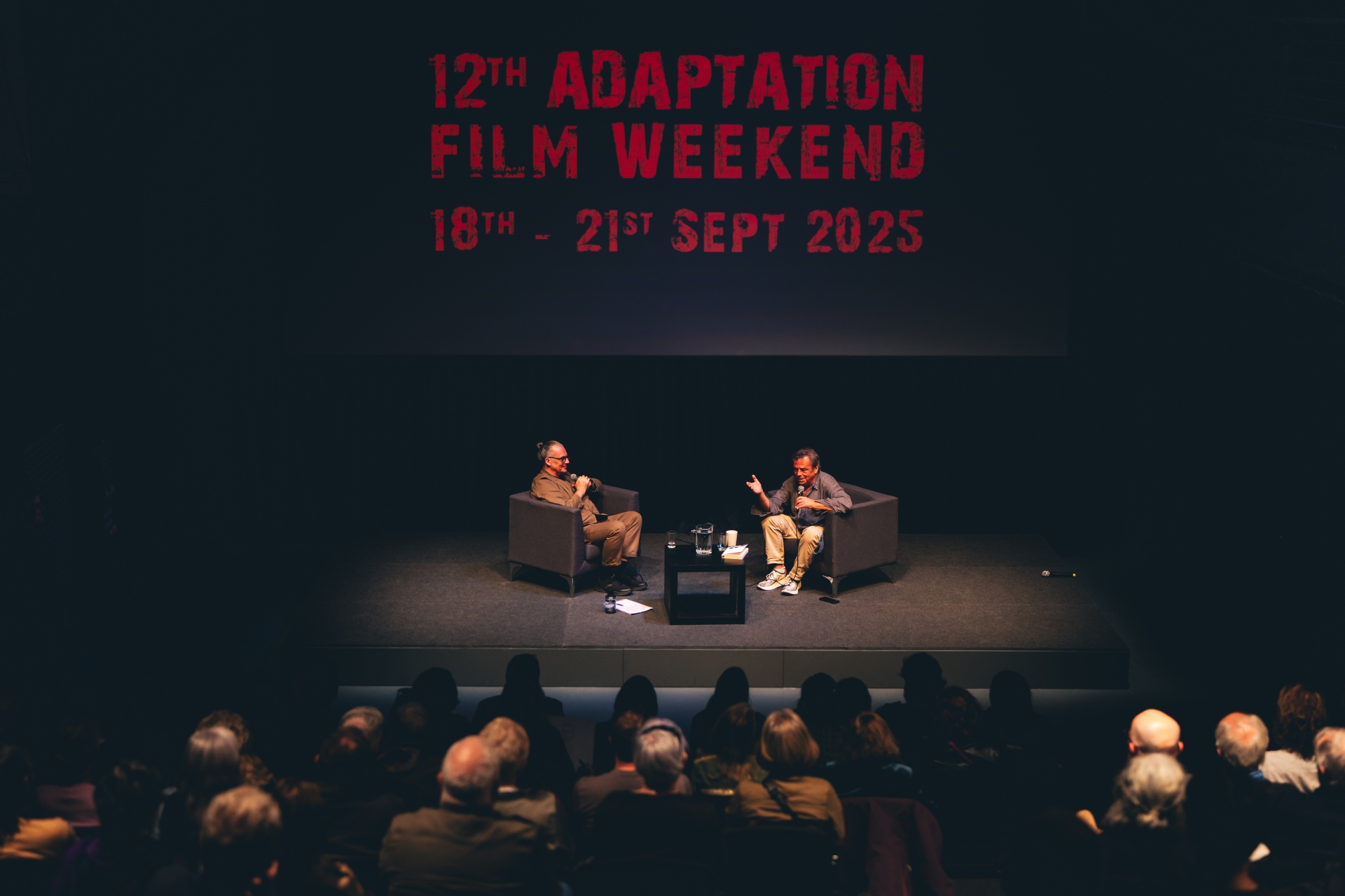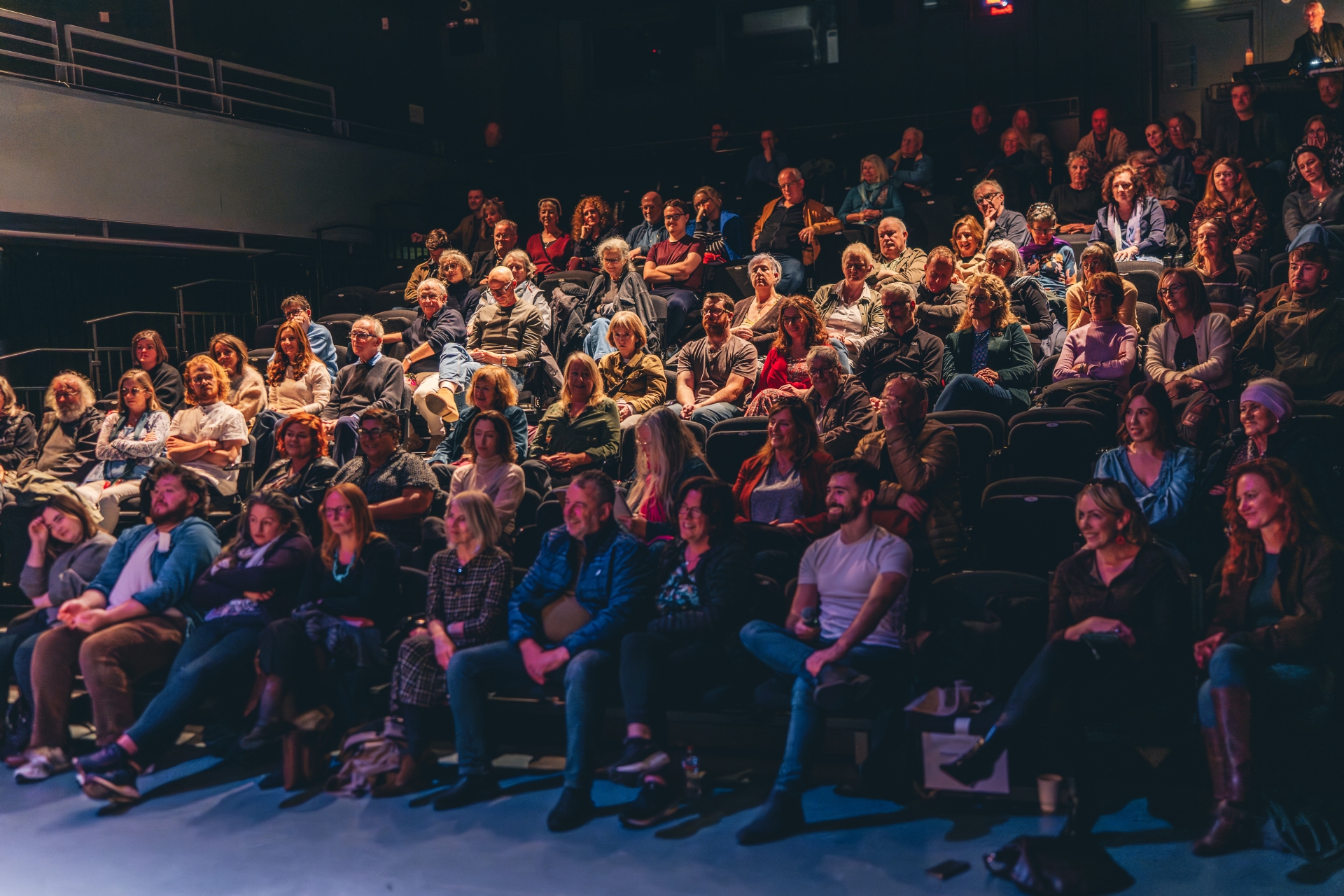
Neil Jordan at the Adaptation Festival in the Model Sligo on Sept 21. Photos credit Laurence Hubbard.
The 12th Adaptation Film Festival welcomed one of Ireland’s most celebrated filmmakers back to his native Sligo last weekend. Neil Jordan, Oscar-winning writer and director of The Crying Game, The Butcher Boy, and Interview with the Vampire, sat down for a public interview that offered both a retrospective on his career and a meditation on the state of cinema today.
The conversation moved quickly to Angel (1982), Jordan’s first feature, and how he found film gave him a way to depict the violence of the Troubles that prose could not. “Film gave me an immediacy I couldn’t find on the page,” he said. “With writing I might circle around things, but with movies I could put the bare fact of violence on screen — killing somebody who could have been your next-door neighbour. I tried to remove all political subtext because it was already running underneath like a dark river.”
That shift from writing to film opened a career that would span genres with abandon. The Company of Wolves (1984), a collaboration with Angela Carter, rewrote fairytales as a gothic fantasy. Mona Lisa (1986) explored noir crime; High Spirits (1988) offered supernatural comedy; Michael Collins (1996) turned history into epic. For Jordan, genre itself has always been an invitation. “Each genre is like a different house with different colours to play in. I’ve done thrillers, fantasies, vampire stories. The only houses I’ve never managed to enter are the musical and the western — and I’d still love to, though I’m getting old now.”
But if any film defined Jordan’s career, it was The Crying Game (1992), which earned him an Academy Award for Best Original Screenplay. “The Crying Game was a big bloody controversy,” he said. “When it came out, it still is a controversy. Some of the trans community gave out to me about it… but I don’t really know why. At the time people only thought of cross-dressing as comedy. This film took the subject seriously. That was controversial then, and it still is.”
He recalled the uphill battle to get it made. “Nobody wanted to make it. I’d walk into meetings and say, it starts with a terrorist, and they’d say, ‘that’s bad.’ Then I’d say, he goes to meet the soldier’s lover in London, and they’d say, ‘okay.’ Then I’d say, the lover turns out to be a man — and that was the end of the conversation.”
Channel 4 eventually agreed to finance it — but only with strings attached. “They said they’d fund it if I changed the ending. I had to write a fake ending. We had so little money. It was horrible, but unforgivable. Later I begged for money to shoot the correct ending. That’s why there were so many endings to The Crying Game.”
Asked what lessons he had learned across four decades of filmmaking, Jordan’s advice was simple: boldness. “The best thing you can do is be bold. With sufficient forethought and planning, you can achieve anything — even a big epic like Michael Collins.”
Yet he also reflected on what cinema has lost in the shift from film to digital technology. “The thrilling thing about shooting on 35mm or 16mm was that you were photographing a unique event that could never be repeated. That uniqueness went into the light, the performances — even a bluebottle buzzing past the lens. With digital, you’re always staring at five monitors, fiddling with knobs. Something is lost. You’re removed from the reality of what you should be photographing.”
Even practical challenges carried their own kind of creativity. On The Company of Wolves, Jordan recalled: “We only had two real wolves. With a bit of make-up and some tricks with the camera we turned dogs into wolves. The trick was getting the handlers out of the shot. But the eyes — we used a lightbox so they glowed at 25 degrees to the camera. It was extraordinary.”
Of all his projects, Jordan singled out The Butcher Boy (1997) as particularly satisfying. “It seemed an impossible film to make because the book was so internal. But Warner Brothers, for some strange reason, wanted to do it. We had the resources to make every element matter — the colours of the town, the fantasy sequences, everything. That was especially satisfying.”
Not every film succeeded. “Some films just don’t work. I made In Dreams for Spielberg’s company, and at a certain point I realised the story was heading nowhere. All the characters you could possibly sympathise with ended up dead. There was nothing I could do. That was an insoluble problem.”
When asked for advice to aspiring filmmakers, Jordan was both blunt and hopeful. “You have to invent new things. Invent new language. Movies may feel in the doghouse now, but turmoil is when the most interesting things come out. It’s worth doing — you just have to make it sing again, make it relevant again.”
It was a fitting close to a festival dedicated to adaptation — bold, questioning, and unafraid to stir debate, just like Jordan himself.
READ MORE Five features and seven shorts filmed in Leitrim over the past year


Subscribe or register today to discover more from DonegalLive.ie
Buy the e-paper of the Donegal Democrat, Donegal People's Press, Donegal Post and Inish Times here for instant access to Donegal's premier news titles.
Keep up with the latest news from Donegal with our daily newsletter featuring the most important stories of the day delivered to your inbox every evening at 5pm.